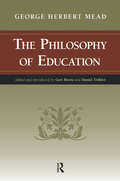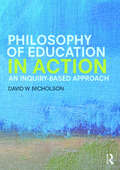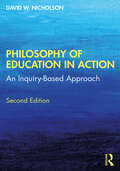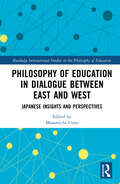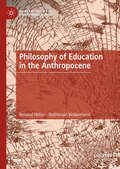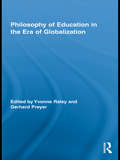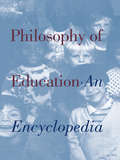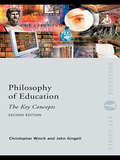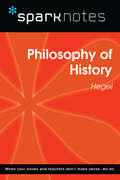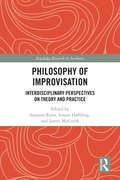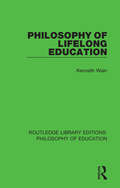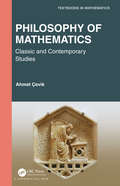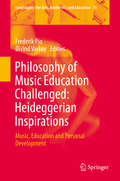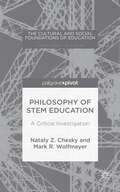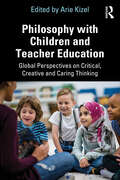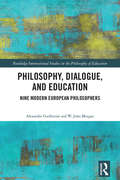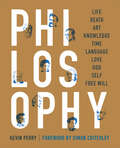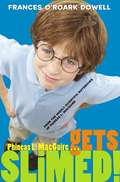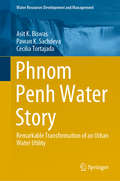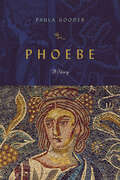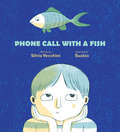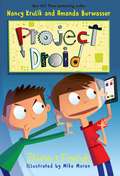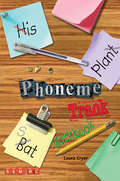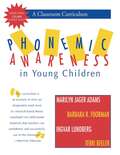- Table View
- List View
Philosophy of Education (Routledge International Studies In The Philosophy Of Education Ser.)
by George Herbert Mead Gert J. Biesta Daniel TrohlerNever before published, this book features George Herbert Mead's illuminating lectures on the Philosophy of Education at the University of Chicago during the early 20th century. These lectures provide unique insight into Mead's educational thought and reveal how his early psychological writings on the social character of meaning and the social origin of reflective consciousness was central in the development of what Mead referred to as his social conception of education. The introduction to the book provides an overview of Mead's educational thought and places it against the wider social, intellectual, and historical background of modern educational concepts.
Philosophy of Education in Action: An Inquiry-Based Approach
by David W. NicholsonPhilosophy of Education in Action is an innovative, inquiry-based introductory text that invites readers to study philosophy of education through the lens of their own observations and experiences. Structured according to a "Wonder Model of Inquiry," each chapter begins by posing a fundamental What if question about curriculum, pedagogy, and the role of the school before investigating the various philosophical perspectives that guide and influence educational practices. Classroom vignettes and examples of actual schools and educational programs help to ground philosophical perspectives in real-world scenarios, while the book's unique inquiry-based approach leads students to both think critically about philosophical questions and apply the concepts to their own teaching. Features of the text include: What if questions that structure each chapter to pique students' curiosity, stimulate creativity, and promote critical thinking. Authentic classroom vignettes that encourage students to analyze what it means to "do" philosophy and to reflect upon their own practices, examine their role in the educational process, and articulate their own philosophical beliefs. A concluding section asking readers to imagine and design their own hypothetical school or classroom as a project-based means of analyzing, synthesizing, and evaluating the different philosophies discussed. Accessible and thought-provoking, Philosophy of Education in Action provides a dynamic learning experience for readers to understand and apply philosophy in educational practice.
Philosophy of Education in Action: An Inquiry-Based Approach
by David W. NicholsonPhilosophy of Education in Action: An Inquiry-Based Approach (Second Edition) is an innovative introductory text that invites readers to explore philosophy of education through the lens of their own observations and experiences. Using the Wonder Model of Inquiry, readers investigate the purposes of education, how schools are designed to fulfill those purposes, and the influence of philosophy on educational practices. Grounded in authentic classroom vignettes and supported by examples from actual schools and educational programs, readers think critically and creatively about philosophical issues. Probing questions analyze the curriculum, examine pedagogy, conceptualize the role of the teacher and student in the learning process, and explore the role of school organization and design. Readers are guided to reflect upon their own practices and articulate their own philosophical beliefs. Readers also imagine and design a hypothetical school using project-based methods to interpret, synthesize, and evaluate different educational philosophies. The Continuum of Educational Philosophy locates practices in relation to philosophical perspectives. The Second Edition includes updated sources and examples of schools and programs that represent different philosophical perspectives. In addition to applying the "3Cs" criteria of evaluation, two new chapters highlight voices that respond to and challenge different educational philosophies. The final chapter adds guidance on how to construct and compose a personal philosophy of education statement.
Philosophy of Education in Dialogue between East and West: Japanese Insights and Perspectives (Routledge International Studies in the Philosophy of Education)
by Masamichi UenoThis edited book opens a dialogue on theories and philosophies of education between the East and the West in the era of globalisation. A great deal of research has been devoted to discussion of the ideas of Western theorists such as Plato, Aristotle, Locke, Rousseau, Kant, Fröbel, Herbert, Dewey, Piaget, and so on, and their thoughts have had a tremendous impact on Japanese educational practices. In addition, the 21st-century society has promoted international academic standardisation of knowledge, skills, and competencies for a knowledge-based economy, making great strides in educational development for globalisation. On the other hand, East Asia has retained its own unique insights and perspectives that cannot entirely be understood by Western philosophies of education alone. The contributors to this volume offer the reader insights into how Japanese and East Asian theories and philosophies of education encounter those from the West, by taking up heated and controversial issues such as education of caring, morality, nature, catastrophe, body and cultivation, art, language, politics, democracy, and modernity. The book will appeal to researchers, teachers, students, policymakers, and anyone interested in the theory and philosophy of education in the East, or those who would like to reconsider education in a multicultural society.
Philosophy of Education in the Anthropocene (Palgrave Studies in Educational Futures)
by Renaud Hétier Nathanaël WallenhorstThis book develops a philosophy of education for the Anthropocene, proposing that we think about education in the light of contemporary bioclimatic challenges. Education is seen as the political means of choice for containing the runaway Earth system change and ensuring the sustainability of human life in society. In this book, Hétier and Wallenhorst continue their work on the biogeophysical and socio-political analysis of the Anthropocene here, tracing the path toward the re-founding of a political education to prepare students to address the greatest challenge of our time: the gradual disappearance of the bioclimatic conditions necessary for our very existence.
Philosophy of Education in the Era of Globalization (Routledge International Studies in the Philosophy of Education)
by Yvonne Raley Gerhard PreyerTerrorism, ethnocentrism, religious tension, competition over limited resources, war - these are just a few of the problems and challenges that have emerged in today's global economy. Globalization both implies and requires economic interdependence; and this should bring with it a heightened sense of the interconnectedness of the participating societies. But unfortunately, as recent events indicate, rather than our having formed a global community, today's society is more fragmented than ever. In light of this, education faces some formidable new challenges. How do we prepare future citizens for the world they will live in? How do we teach future generations to embrace the paradox of accepting the value of multiculturalism despite the conflicts it has produced? How do we instill religious tolerance in a time when fundamentalism has become inextricably tied with terrorism? How do we promote economic growth in the face of overpopulation and its depletion of resources? The authors of this collection of essays explore these and related challenges, and they suggest some novel ways of dealing with them.
Philosophy of Education: An Encyclopedia (Studies In Education #Vol. 10)
by J. J. ChamblissFirst Published in 1996. Routledge is an imprint of Taylor & Francis, an informa company.
Philosophy of Education: The Key Concepts (Routledge Key Guides)
by Christopher Winch John GingellThis new edition of Philosophy of Education: The Key Concepts is an easy to use A-Z guide summarizing all the key terms, ideas and issues central to the study of educational theory today. Fully updated, the book is cross-referenced throughout and contains pointers to further reading, as well as new entries on such topics as: Citizenship and Civic Education Liberalism Capability Well-being Patriotism Globalisation Open-mindedness Creationism and Intelligent Design. Comprehensive and authoritative this highly accessible guide provides all that a student, teacher or policy-maker needs to know about the latest thinking on education in the 21st century.'
Philosophy of History (SparkNotes Philosophy Guide)
by SparkNotesPhilosophy of History (SparkNotes Philosophy Guide) Making the reading experience fun! SparkNotes Philosophy Guides are one-stop guides to the great works of philosophy–masterpieces that stand at the foundations of Western thought. Inside each Philosophy Guide you&’ll find insightful overviews of great philosophical works of the Western world.
Philosophy of Improvisation: Interdisciplinary Perspectives on Theory and Practice (Routledge Research in Aesthetics)
by Susanne Ravn; Simon Høffding; James McGuirkThis volume brings together philosophical and interdisciplinary perspectives on improvisation. The contributions connect the theoretical dimensions of improvisation with different viewpoints on its practice in the arts and the classroom. The chapters address the phenomenon of improvisation in two related ways. On the one hand, they attend to the lived practices of improvisation both within and without the arts in order to explain the phenomenon. They also extend the scope of improvisational practices to include the role of improvisation in habit and in planned action, at both individual and collective levels. Drawing on recent work done in the philosophy of mind, they address questions such as whether improvisation is a single unified phenomenon or whether it entails different senses that can be discerned theoretically and practically. Finally, they ask after the special kind of improvisational expertise which characterizes musicians, dancers, and other practitioners, an expertise marked by the artist’s ability to participate competently in complex situations while deliberately relinquishing control. Philosophy of Improvisation will appeal to anyone with a strong interest in improvisation, to researchers working in philosophy, aesthetics, and pedagogy as well as practitioners involved in different kinds of music, dance, and theater performances.
Philosophy of Improvisation: Interdisciplinary Perspectives on Theory and Practice (Routledge Research in Aesthetics)
by Susanne Ravn; Simon Høffding; James McGuirkThis volume brings together philosophical and interdisciplinary perspectives on improvisation. The contributions connect the theoretical dimensions of improvisation with different viewpoints on its practice in the arts and the classroom. The chapters address the phenomenon of improvisation in two related ways. On the one hand, they attend to the lived practices of improvisation both within and without the arts in order to explain the phenomenon. They also extend the scope of improvisational practices to include the role of improvisation in habit and in planned action, at both individual and collective levels. Drawing on recent work done in the philosophy of mind, they address questions such as whether improvisation is a single unified phenomenon or whether it entails different senses that can be discerned theoretically and practically. Finally, they ask after the special kind of improvisational expertise which characterizes musicians, dancers, and other practitioners, an expertise marked by the artist’s ability to participate competently in complex situations while deliberately relinquishing control. Philosophy of Improvisation will appeal to anyone with a strong interest in improvisation, to researchers working in philosophy, aesthetics, and pedagogy as well as practitioners involved in different kinds of music, dance, and theater performances.
Philosophy of Lifelong Education (Routledge Library Editions: Philosophy of Education #19)
by Kenneth WainThis book, first published in 1987, provides a rigorous philosophical analysis of lifelong education. The author presents his arguments simply and directly so that the book is accessible to students who are new to philosophy and adult education.
Philosophy of Mathematics: Classic and Contemporary Studies (Textbooks in Mathematics)
by Ahmet CevikThe philosophy of mathematics is an exciting subject. Philosophy of Mathematics: Classic and Contemporary Studies explores the foundations of mathematical thought. The aim of this book is to encourage young mathematicians to think about the philosophical issues behind fundamental concepts and about different views on mathematical objects and mathematical knowledge. With this new approach, the author rekindles an interest in philosophical subjects surrounding the foundations of mathematics. He offers the mathematical motivations behind the topics under debate. He introduces various philosophical positions ranging from the classic views to more contemporary ones, including subjects which are more engaged with mathematical logic. Most books on philosophy of mathematics have little to no focus on the effects of philosophical views on mathematical practice, and no concern on giving crucial mathematical results and their philosophical relevance, consequences, reasons, etc. This book fills this gap. The book can be used as a textbook for a one-semester or even one-year course on philosophy of mathematics. "Other textbooks on the philosophy of mathematics are aimed at philosophers. This book is aimed at mathematicians. Since the author is a mathematician, it is a valuable addition to the literature." - Mark Balaguer, California State University, Los Angeles "There are not many such texts available for mathematics students. I applaud efforts to foster the dialogue between mathematics and philosophy." - Michele Friend, George Washington University and CNRS, Lille, France
Philosophy of Music Education Challenged: Heideggerian Inspirations
by Frederik Pio Øivind VarkøyThis volume offers key insights into the crisis of legitimization that music as a subject of arts education seems to be in. Music as an educational subject is under intense pressure, both economically, due to the reduction of education budgets, as well as due to a loss of status with policy makers. The contributions in this book illuminate Martin Heidegger's thinking as a highly cogent theoretical framework for understanding the nature and depth of this crisis. The contributors explore from various angles the relationship between the pressure on music education and the foundations of our technical and rationalized modern society and lead the way on the indispensable first steps towards reconnecting the cultural practices of education with music and its valuable contributions to personal development.
Philosophy of STEM Education: A Critical Investigation
by Nataly Z. Chesky Mark R. WolfmeyerFramed as educational equality initiatives that will help students gain the knowledge they need to compete in the global marketplace, STEM may be the most indicative educational reform discourse of our time and has grown to become one of the primary foci of educational policy, in part due to association with a wide array of today's industries: from information and communications technology to the medical field, to sustainability innovations. This book's primary focus is to shift the attention away from such utilitarian aims and ask critical questions about what aims the STEM initiatives are asking for and what assumptions do they hold about both teaching STEM and the nature of STEM content. In order to answer the above questions, the authors use a philosophical lens to study STEM policies as a political and social phenomenon.
Philosophy with Children and Teacher Education: Global Perspectives on Critical, Creative and Caring Thinking
by Arie KizelThis rich collection of essays offers a broad array of perspectives from prominent international ‘philosophy for/with children’ (P4wC) scholars and practitioners regarding the interface between P4wC and teacher education and training curricula. The book considers the deep and varied points of contact that exist between the pedagogical and philosophical principles of the philosophical community of inquiry and teacher education and training programs. It is designed to help improve education systems worldwide as they seek to shift their attention towards the student, student inter-relations, and student-other relations and foster independent high-order, critical, creative, and caring thinking within democratic, pluralistic societies. It proposes an innovative, creative way of approaching teacher education and training—a central subject in today’s educational world. Offering diverse perspectives on integrating progressive educational philosophy and contemporary pedagogy, Philosophy with Children and Teacher Education is a must-read for all those studying philosophy for/with children and researching in this area.
Philosophy, Dialogue, and Education: Nine Modern European Philosophers (Routledge International Studies in the Philosophy of Education)
by Alexandre Guilherme W. John MorganPhilosophy, Dialogue, and Education is an advanced introduction to nine key European social philosophers: Martin Buber, Mikhail Bakhtin, Lev Vygotsky, Hannah Arendt, Emmanuel Levinas, Maurice Merleau-Ponty, Simone Weil, Michael Oakeshott, and Jürgen Habermas. This detailed yet highly readable work positions the socio-political views of each philosopher within a European tradition of dialogical philosophy; and reflects on the continuing theoretical relevance of the work of each to education generally and to critical pedagogy. The discussion in each chapter is informed by materials drawn from various scholarly sources in English and is enriched by materials from other languages, particularly French, German, and Russian. This enhances the comparative European cultural perspective of the book; and connects the work of each philosopher to wider intellectual, political, and social debates. The book will appeal to academics, postgraduates, and researchers working in philosophy, philosophy of education, and in educational, cultural, and social studies more generally. Advanced undergraduate students would also benefit from the book’s discussion of primary sources and the authors’ suggestions for further reading.
Philosophy: Philosophy In The Poetry Of Wallace Stevens
by Kevin PerryPhilosophy is to question everything. More than a lifestyle, larger than any single idea, broader than a conviction, philosophy is the love of exploration, of knowledge, of uncertainty, and of that cornerstone of free thinking: doubt. Kevin Perry's "Philosophy" takes the reader on a grand tour of life's biggest questions, examining all that the world's greatest philosophers have said about life and death, love and loss, language, art and God, to name a few. Philosophy is a great companion and a roadmap to navigate life's major milestones, including: How to make sense of death What loving someone or something means The effect of art on our lives What role language plays in understanding the world How do our ideas affect our actions
Phineas L. MacGuire ... Gets Slimed!
by Frances O'Roark DowellPhineas L. MacGuire (a.k.a. Mac) has three goals for fourth grade: 1. To be the best fourth-grade scientist ever. 2. To be the best fourth-grade scientist ever. 3. To be the best fourth-grade scientist ever. It's a tall order, but he's confident that he can achieve it, especially since his friend and rival scientist, Aretha, has asked him to help her earn a scout badge by creating the mold that produces penicillin. After all, who knows more about mold than Mac? And how many fourth graders can say that they've reproduced penicillin? None, as far as Mac knows. But then he has to manage Ben's campaign for class president and deal with his new babysitter, Sarah Fortemeyer, "the Teenage Girl Space Alien from the Planet Pink" who accidentally got rid of his dried worm collection and now he has to find it. How is he supposed to find time to focus on mold? The second book about Phineas L. MacGuire and his scientific experiments, "Phineas L. MacGuire ... Gets Slimed!", is as much fun as the first, and includes slimy new experiments that you can do at home!
Phnom Penh Water Story: Remarkable Transformation of an Urban Water Utility (Water Resources Development and Management)
by Asit K. Biswas Cecilia Tortajada Pawan K. SachdevaThis book analyses how a water utility from a developing country, Phnom Penh Water Supply Authority, that was totally dysfunctional, corruption-ridden and literally bankrupt in 1993, became one of the most successful water utilities of the developing world in only about 15 years. By 2010, some of the performance indicators of this public sector utility were even better than London, Paris or Los Angeles. The book further analyses the enabling conditions that made this remarkable transformation possible. Based on this analysis, a framework is recommended for water utilities from developing countries so that they can also be transformed into functional, efficient, equitable and financially viable institutions on a sustainable basis.
Phoebe: A Story
by Paula GooderSometime around 56 AD, the apostle Paul wrote to the church in Rome. He entrusted this letter to Phoebe, whom he describes as the deacon of the church at Cenchreae and a patron of many. But who was this remarkable woman? Biblical scholar and popular author and speaker Paula Gooder imagines Phoebe's story—who she was, the life she lived, and her first-century faith—and in doing so opens up Paul's world, giving a sense of the cultural and historical pressures that shaped his thinking and the faith of the early church. After the narrative, Gooder includes an extensive notes section with comments on the historical context, biographical details, cultural practices, and more. Rigorously researched, this is a book for anyone who wants to engage more deeply and imaginatively with Paul's theology.
Phone Call with a Fish
by Silvia VecchiniA story for anyone who has felt like a fish out of water There&’s a boy in class who doesn&’t say anything. He doesn&’t yell when a student steps on his foot, and he writes his answers to the teacher&’s questions on the board. One of his classmates is trying to understand why he&’s so quiet, but she can&’t figure it out. But then one day the class goes to the science museum, and she discovers a phone with an aquarium full of fish on the other end of the line. And the fish, as it turns out, aren&’t silent after all—they just have their own way of communicating. This empathy-building story will encourage readers to approach others with compassion and understanding.
Phone-y Friends (Project Droid)
by Nancy Krulik Amanda Burwasser Mike MoranLogan auditions for the school play and is chosen for the role of Chipmunk Number Three, but unfortunately, Java, Logan's robot cousin, doesn't get a part, which means he and Logan won't be hanging out together every day after school. Logan's excited to have something to himself and starts spending more and more time with his new friends.Now with so much time on his hands, Java is determined to make some new friends, too--the dishwasher, the electric mixer, the refrigerator . . . But his favorite new friend is Spike, the voice activated program on Mrs. Applebaum's cell phone. While Java can't be in the play, he ends up helping out with building the sets, and almost blows his cover! But when Logan freezes and forgets his lines on stage, and Java (who has memorized them in an instant) feeds them to him the Cyrano-style, it's the android who saves the day. After all, that's what friends are for.Internationally bestselling author Nancy Krulik and her incredibly talented daughter, Amanda Burwasser, spin hilarious high jinks in the fourth book in the Project Droid series, which combines the literalness of Amelia Bedelia with a wacky modern edge, making for hours of laughter. And the fun continues with an activity in the back!
Phoneme Track Workbook
by Laura CryerThis photocopiable workbook links with the Phoneme Track CD-ROM, published by SEMERC to support phonics work within the National Literacy Strategy, focusing on hearing, identifying, segmenting and blending of phonemes. Without specific phoneme awareness training, phonics can make no sense and spellings of words can only be learned by rote - reading is there fore not able to be automatic. Research indicates that all young readers benefit from explicit assistance with phonemic awareness and many need more intensive training. The book is suitable for Key Stage 1 and 2 pupils and older learners with specific phonological difficulties.
Phonemic Awareness in Young Children: A Classroom
by Marilyn J. Adams Dr Barbara Foorman Ingvar Lundberg Terri Beeler Ed.D.Phonemic Awareness in Young Children complements any prereading program. From simple listening games to more advanced exercises in rhyming, alliteration, and segmentation, this best-selling curriculum helps boost young learners' preliteracy skills in just 15-20 minutes a day. Specifically targeting phonemic awareness — now known to be an important step to a child's early reading acquisition — this research-based program helps young children learn to distinguish individual sounds that make up words and affect their meanings. <p><p> With a developmental sequence of activities that follows a school year calendar, teachers can chose from a range of activities for their preschool, kindergarten, and first-grade classrooms. Plus, the curriculum includes an easy-to-use assessment test for screening up to 15 children at a time. This assessment not only helps to objectively estimate the general skill level of the class and identify children who may need additional testing but may also be repeated every 1-2 months to monitor progress. All children benefit because the curriculum accommodates individualized learning and teaching styles.
